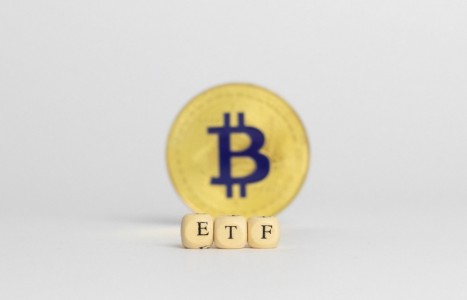ARTICLE AD BOX

Welcome to our comprehensive guide on the fusion of exchange-traded Funds (ETFs) and Bitcoin (BTC). Whether you're a seasoned investor or just starting, join us as we unravel the intricacies of ETFs tracking Bitcoin, examining the benefits, risks, and everything in between.
Understanding ETFs and Bitcoin
Exchange-Traded Funds (ETFs):
• ETF BTC trading platforms offer access to investment funds traded on stock exchanges, providing diversified exposure to various assets like stocks, bonds, commodities, or currencies.
• These funds are designed to track the performance of an underlying index, asset, or basket of assets, providing investors with a convenient way to gain exposure to specific markets.
Bitcoin (BTC):
• Bitcoin is a decentralized digital currency, created in 2009 by an anonymous entity known as Satoshi Nakamoto.
• It operates on a peer-to-peer network using blockchain technology, enabling secure and transparent transactions without the need for intermediaries.
• Exploring ETFs Tracking Bitcoin:
Bitcoin ETFs:
• ETF BTC are investment vehicles that enable investors to gain exposure to the price movements of Bitcoin without owning the cryptocurrency directly.
• These ETFs typically invest in Bitcoin futures contracts or other derivatives, allowing investors to speculate on the price of Bitcoin without the complexities of buying and storing the digital asset.
Benefits of Investing in ETFs and Bitcoin
Diversification:
• ETFs offer investors access to a diversified portfolio of assets, helping to mitigate risk and reduce exposure to individual securities.
• Bitcoin ETFs diversify the cryptocurrency market, allowing investors to spread their risk across different assets.
Accessibility:
• ETFs and Bitcoin ETFs are traded on stock exchanges, providing investors with easy access to these investment opportunities through traditional brokerage accounts.
• Bitcoin ETFs offer a regulated and accessible way for traditional investors to invest in Bitcoin without the technical hurdles of buying and storing cryptocurrency.
Liquidity:
• ETFs are highly liquid investments, with shares traded on stock exchanges throughout the trading day at market-determined prices.
• Bitcoin ETFs provide liquidity to investors who want exposure to the cryptocurrency market without the liquidity constraints of trading Bitcoin directly on cryptocurrency exchanges.
Potential for Growth:
• Bitcoin has demonstrated significant potential for growth over the years, attracting investors seeking high returns and portfolio diversification.
• Bitcoin ETFs offer investors a convenient way to capitalize on the potential growth of Bitcoin while benefiting from the diversification and liquidity of ETFs.
Risks of Investing in ETFs and Bitcoin
Market Risk:
• Both ETFs and Bitcoin are subject to market volatility, with prices fluctuating in response to various factors such as market sentiment, economic conditions, and regulatory developments.
• Investors should be prepared for the possibility of significant price fluctuations when investing in ETFs tracking Bitcoin.
Counterparty Risk:
• Bitcoin ETFs that invest in derivatives contracts are exposed to counterparty risk, which is the risk that the counterparty to the contract may default on its obligations.
• Investors should carefully assess the creditworthiness of the counterparties and the terms of the derivatives contracts before investing in Bitcoin ETFs.
Regulatory Risk:
• The regulatory environment surrounding Bitcoin and ETFs tracking Bitcoin is evolving and may impact the legality, trading volume, and investor confidence in these investments.
• Investors should stay informed about regulatory developments and consider the potential impact on their investment decisions.
Security Risk:
• Investing in Bitcoin directly or through Bitcoin ETFs exposes investors to security risks associated with storing digital assets in digital wallets.
• Investors should take appropriate measures to secure their digital assets and protect against theft, hacking, or other security breaches.
Comparison Between Traditional ETFs and Bitcoin ETFs
Underlying Assets:
• Traditional ETFs typically track a broad market index or a specific sector, providing investors with exposure to traditional asset classes such as stocks, bonds, or commodities.
• Bitcoin ETFs track the price of Bitcoin or invest in Bitcoin-related assets, offering investors exposure to the cryptocurrency market.
Volatility:
• Bitcoin ETFs tend to be more volatile than traditional ETFs due to the inherent volatility of Bitcoin and the cryptocurrency market.
• Investors should be prepared for the possibility of significant price fluctuations when investing in Bitcoin ETFs.
Regulation:
• Traditional ETFs are subject to stringent regulatory oversight by government authorities, providing investors with a level of protection and transparency.
• Bitcoin ETFs may face regulatory challenges due to the decentralized nature of Bitcoin and concerns about market manipulation, posing additional risks for investors.
How to Invest in ETFs and Bitcoin
Choose a Reputable Brokerage Platform:
• Select a reputable brokerage platform that offers a wide range of ETFs and Bitcoin investment options, ensuring that it is regulated and trustworthy.
Conduct Thorough Research:
• Research different ETFs and Bitcoin ETFs to understand their investment objectives, underlying assets, fees, and performance history.
• Consider factors such as management fees, tracking error, liquidity, and regulatory compliance when evaluating ETFs and Bitcoin ETFs.
Assess Your Investment Goals and Risk Tolerance:
• Determine your investment goals, risk tolerance, and time horizon before investing in ETFs or Bitcoin.
• Consider whether you're investing for growth, income, capital preservation, or a combination of these objectives, and adjust your investment strategy accordingly.
Diversify Your Investment Portfolio:
• Diversify your investment portfolio by allocating funds to a mix of ETFs, Bitcoin, and other asset classes to mitigate risk and optimize returns.
• Consider your investment objectives, risk tolerance, and time horizon when diversifying your portfolio to achieve a balanced and well-rounded investment strategy.
FAQs
Q: Are Bitcoin ETFs safe?
A: Bitcoin ETFs carry inherent risks, including market volatility, regulatory uncertainty, and security risks. Investors should carefully assess these risks and consider their risk tolerance before investing in Bitcoin ETFs.
Q: Can I invest in Bitcoin directly instead of through ETFs?
A: Yes, you can invest in Bitcoin directly by purchasing and holding the cryptocurrency in a digital wallet. However, investing in Bitcoin directly requires technical knowledge and carries security risks associated with storing digital assets securely.
Q: What are the fees associated with investing in ETFs and Bitcoin?
A: ETFs typically charge management fees, which are expressed as a percentage of assets under management (AUM). Bitcoin ETFs may also charge additional fees, such as custodial fees or trading fees. It's important to carefully review the fee structure of each investment option before making a decision.
Conclusion
In conclusion, the convergence of ETFs and Bitcoin offers investors exciting opportunities for diversification, growth, and portfolio optimization. ETFs provide investors with access to a diversified portfolio of assets, while Bitcoin offers the potential for significant growth and portfolio diversification.
Bitcoin ETFs bridge the gap between traditional finance and the cryptocurrency market, providing investors with a regulated and accessible way to invest in Bitcoin. However, they also come with their own set of risks, including market volatility, regulatory uncertainty, and security risks.
As with any investment, it's essential to conduct thorough research, assess your investment goals and risk tolerance, and diversify your investment portfolio to achieve your financial objectives. By understanding the fundamentals of ETFs and Bitcoin and adopting a disciplined investment approach, investors can navigate this dynamic landscape with confidence and clarity. Happy investing!
.png)
 7 months ago
4
7 months ago
4








 English (US)
English (US)